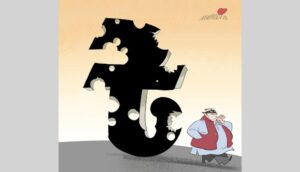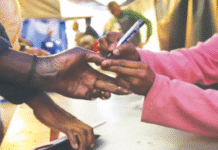
THE fiscal health of Bangladesh is perhaps the most concerning issue today. Every news headline points towards rising prices of food, concerns over a depleting power sector, and the trending headline of the ever-depreciating taka against the dollar. The taka, as we are all aware now, has hit an all-time low, spiking 12.4 per cent food inflation with an overall 9.4 per cent inflation of the national economy.
The working people cannot afford meat; beef and mutton are considered luxuries. Even chicken and eggs have left the staple plate of the average household dinner table. The sheer worry of the days to come as elections approach has shaken people’s faith in the economy and especially in the public institutions that are in charge of managing it.
Yet we are celebrating the opening of a third international airport terminal, a metro rail extension, and now an express way. It seems schizophrenic that, on the one hand, we are struggling for food and, on the other hand, we are moving towards high-quality infrastructure. The news feels almost dystopic. Dengue remains widespread and is now being underreported in the media against the celebratory pieces of large-scale project launch announcements; electricity blackouts are everywhere outside the capital city; and the incessant rains have recently exposed how weak the drainage systems are in Chittagong and Dhaka, bringing both of our most advanced cities to a halt.
How did we get here?
The foreign reserve is officially at slightly over $20 billion, according to the Bangladesh Bank. This revised figure was calculated by the Bangladesh Bank following the IMF’s Balance of Payments and International Investment Position Manual, which it had neglected to do earlier in the year.
The reserve numbers have been kept in the dark for so long away from the public that, at present, we just cannot tell what the actual figures are.
It should be stated that the IMF has not been as benevolent a benefactor as it is portrayed to be. It has a history of failed economic solutions dating back to creating more problems during the Latin American debt crisis in the 1980s. The anti-sovereign structural adjustment programmes in the 1990s crippled lower and middle-income countries by forcing them to relinquish key sectors like energy, health and even education to the predatory private sector. And most recently, the IMF’s dark hand was found quite red in dismantling the Greek economy through imposing strict austerity measures in 2008 during the global financial crisis. The IMF commits to a neoliberal agenda that aims to privatise national sectors, forcing the polar accumulation of wealth, which often benefits the few at the cost of the many.
Still here, we are desperate and begging for a bailout, and hence have to listen to the piper.
IMF austerity conditions for Bangladesh at present include a swathe of policies to increase the nation’s tax bracket. Outlandish taxation on marriages and zero-return tax filings were being proposed to the general public, which were immediately revoked as it triggered public uproar. There have also been IMF recommendations for floating energy prices, which were implemented in January 2023, leading to a spike in the cost of diesel and petrol. And while LNG and oil prices dropped on the international market in the first quarter, we, the Bangladeshi public, are still paying very high prices for energy, resulting in the cascading rise of prices for consumer goods.
It would be unfair to blame all of our problems on the IMF, as we also have ourselves to blame. Over the last decade, the Bangladesh economy has made detrimental choices in regards to our economic and fiscal management. We have ended up with a foreign reserve crisis because of our own structural manipulations of key sectors, which included the banking sector, the power sector, infrastructure and trade, among others. The resulting corruption and wastage of resources have further exacerbated the current crisis.
In the power sector, for example, we witnessed that through the Power Sector Master Plan of 2017 and policies such as the Special Provision Act, the government shifted the energy sector towards an import-based model. This meant power plants operating on coal and LNG were completely dependent on the international market to meet national energy needs. Quick-rental power plants and independent power producers have been repeatedly mentioned in news articles for how much they have been charging capacity charges, draining the national economy. The IMF itself has warned the government of its overcapacity in the power sector and how it is just bleeding away precious foreign reserves by providing capacity charges for idle quick-rental power plants owned by very powerful business and political elites. In most cases, in the power sector, the business and the political elites are not separate but are one and the same.
In terms of trade, the government is deeply import-dependent and suffers a massive trade deficit in comparison to middle-income countries such as Thailand, Singapore and Malaysia. Bangladesh imports onion, chilli, consumer goods (even eggs from India these days), and the very cotton that is used in the export-oriented garments sector. Unfortunately, European and US markets in this Ukraine war scenario have not been encouraging for Bangladesh garment exports. Recent news reports have stated that garment exports are facing the lowest returns in the past four years, whereas, with rising living expenses, desperate garment workers are demanding Tk 25,000 as the minimum wage, and rightfully so.
The news around our remittances is also bleak, with reports of the lowest flows since pre-pandemic reaching our shores. Recently, on a flight from Kuwait, I overheard two workers discussing how five lakh jobs in Malaysia meant for Bangladeshis have been handed over to Nepal. If this is true, then we have been dealt a heavy blow in terms of remittance flows from Malaysia in 2024, and this also does not reflect well on how the current regime is negotiating labour exports with the Malaysian government.
The hornet’s nest of problems is not just in the power sector, garments, and manpower, as we should still take a look at the country’s debt crisis in relation to large-scale project financing. Large-scale projects touted as indicators of our development hide a much darker reality. The project loans have often been financed by multilateral development banks such as AIIB, ADB, and WB, but we have also seen the likes of bilateral banks like JICA and China EXIM Bank playing a key role in funding large-scale projects across the country. All these loans need debt service from the foreign reserves. Not to mention most large-scale projects are riddled with cost overruns, corruption, and safeguards problems and remain unfinished, incomplete, and sometimes just stalled indefinitely, suffering heavy losses.
It is the executive committee of the National Economic Council that approves infrastructure projects to push through. As a public body, it is ECNEC that should have weighed the consequences of taking on project loans against the economy of the country. ECNEC should be conducting due diligence on project preparation, budget review, safeguard compliance, and long-term fiscal impact on the national economy before they go ahead and approve any project. Clearly, ECNEC has not done so, which could mean institutional incompetence, and if it is not incompetence, then it has operated with ill intent.
We can only imagine, while we, the public, were forced into the lockdown period of 2020–2021, how many large-scale projects have been approved without any public inquiry or disclosure. A recent news report by an English daily stated that on July 7, 2015, ECNEC approved the Rural Infrastructure 2 project, designed to allocate Tk 6,076 crore to 284 MPs. The news article stated further that this approval directly violated the constitutional rights of local governments to plan and prepare projects. Through this approval, ECNEC has handed over those powers to MPs, thus diffusing the separation of powers of the legislative branch of government from the executive branch. We can only imagine the corruption and illicit financial flows that have filtered through the Rural Infrastructure-2 project, which is just one of many examples.
Similarly, we have seen the government take on Covid cares $1.6 billion in loans from the ADB. The NGO Forum on ADB, an Asia-wide independent civil society network, tried to investigate how the $1.6 billion was disbursed by the government. Unfortunately, the funds ended up in direct budget support and through arbitrary allocations without any public disclosure during the pandemic period. Even the ADB itself called upon the NGO Forum on ADB, inquiring if civil society had any information on the borrowing of the loan. This lack of transparency around loans in the billions of dollars is deeply alarming and telling of the corruption embedded in the development project system, and it is therefore no surprise that we are now being handed a staggering bill of repayment with hardly anything to show for it.
It would be unfair to not acknowledge the flight of capital and money laundering as one of the final nails in the economic coffin we are in at the moment. The Washington-based think tank Global Financial Integrity has been publishing information on Bangladesh since 2004. GFI data for other countries is available up to 2017, but information on Bangladesh has remained stagnant since 2015. This happened, as is feared, because Bangladesh has ‘mysteriously’ refrained from providing data on international trade to the UN since 2016.
According to Global Financial Integrity, $7.53 billion has been laundered each year from Bangladesh. We have ranked 33rd among the 135 developing countries in regards to our prowess in money laundering. An interesting and alarming trend emerges in terms of the frequency of capital flight in relation to electoral cycles. One news report mentions that deposits in Swiss banks from Bangladesh rose drastically during 2006 and 2007 amid electoral uncertainties, but they trickled down in 2008 due to strict measures taken by the military-backed caretaker government. The deposits again dramatically rose prior to the 2014 election. It would be interesting to track how deposits are faring from Bangladesh to the Swiss Bank or other foreign destinations in the months before the election.
Some say that Tk 1,000 crore fly from Bangladesh to Canada illegally every day. While the figure may be debatable, the nature of the problem cannot be denied. As we are heading towards elections in December or January, we can assume that capital flight will only increase.
The only glimmer of hope is the fact that we as a people are reliant on each other, especially through our informal economy, which generates 85 per cent of employment. This informal economy has fed us, protected us and helped us survive the pandemic. While the powerful continue to loot and scheme for positions, the people continue to work hard, innovate and persevere. Only if we had political and state leadership that aimed for the interests of the people and the masses, what could we not have achieved?
Rayyan Hassan is executive director, NGO Forum on ADB.
New Age









